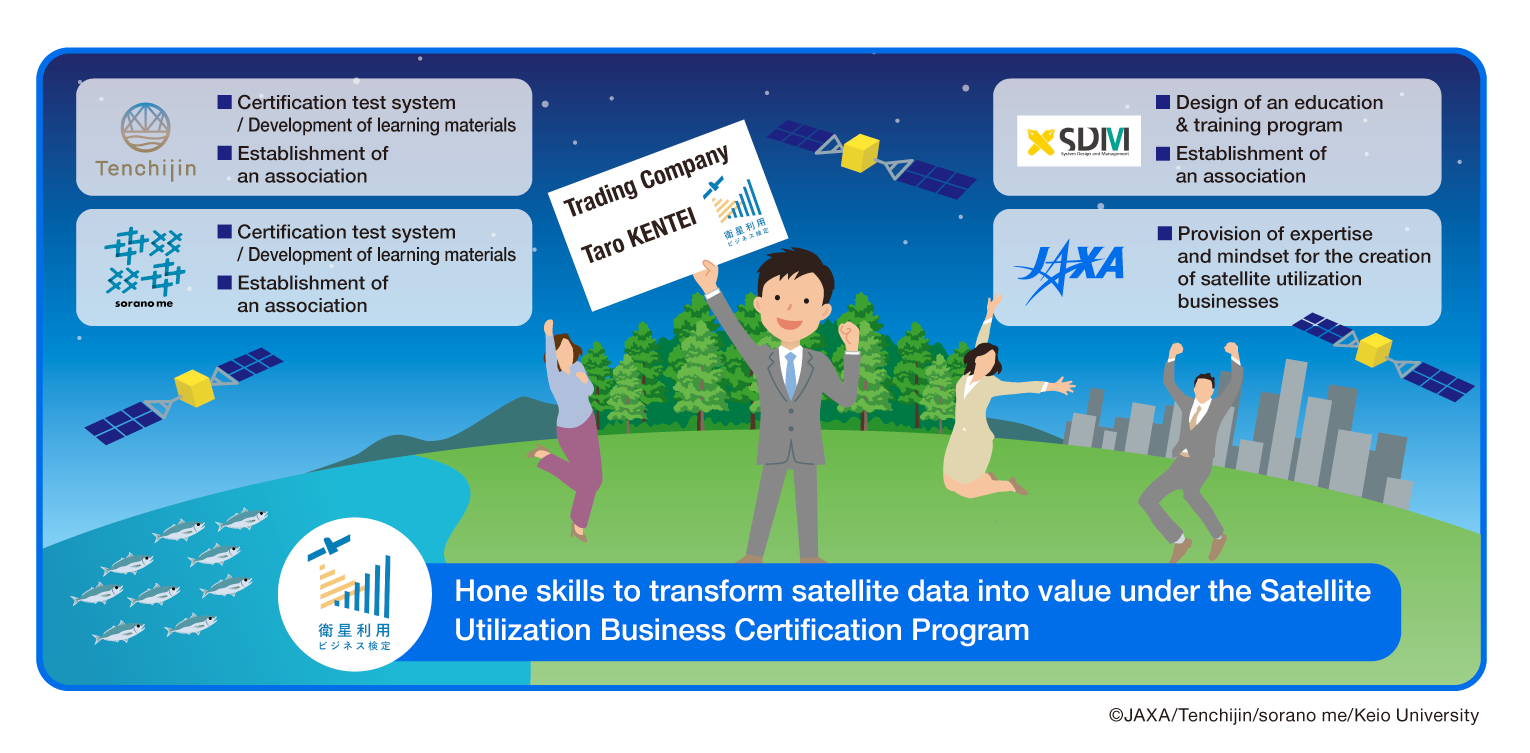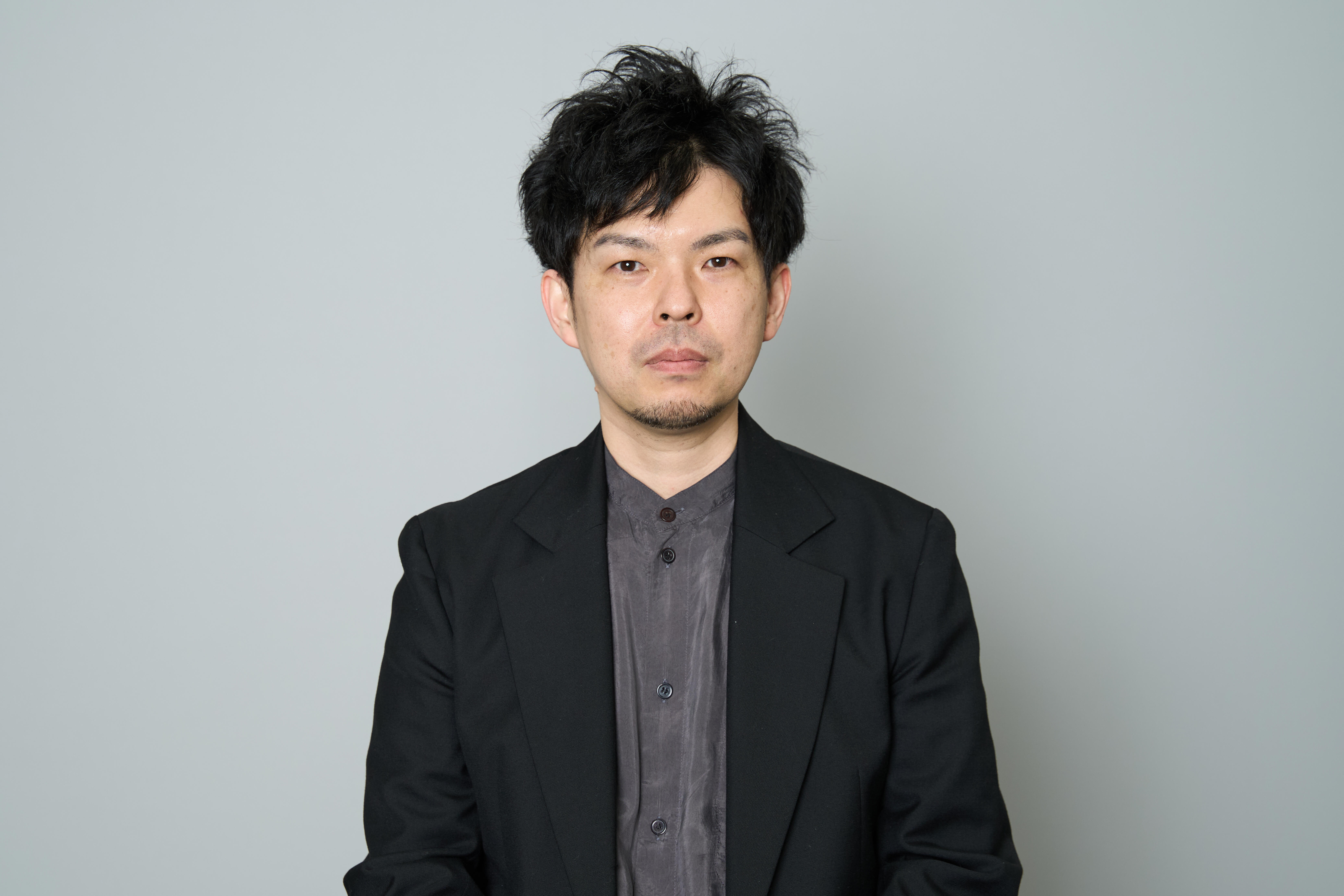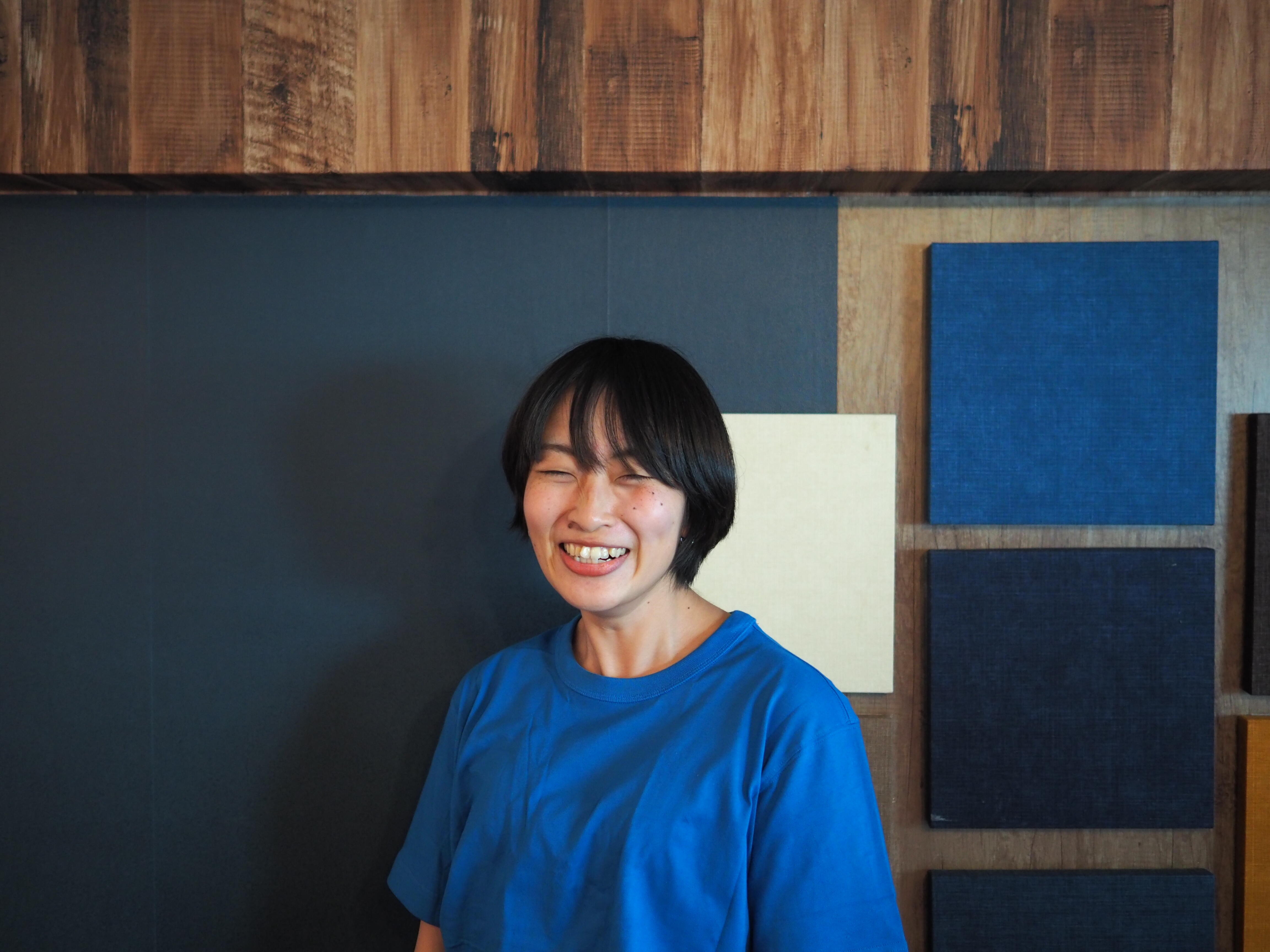Tenchijin inc., sorano me inc., Keio University, and JAXA Launch the Satellite Utilization Business Certification Program to Advance Skills to Convert Satellite Data into Value
May 22, 2024 (JST)
Japan Aerospace Exploration Agency
Tenchijin Inc.
sorano me inc.
Keio University
Tenchijin Inc. (CEO: SAKURABA Yasuhito; hereinafter, “Tenchijin”)*1, sorano me inc. (CEO: KIDO Ayano; hereinafter, “sorano me”)*2, the Graduate School of System Design and Management, Keio University (Dean: Professor SHIRASAKA Seiko, hereinafter; “Keio SDM”)*3 and the Japan Aerospace Exploration Agency (President: YAMAKAWA Hiroshi; hereinafter “JAXA”) began conducting a co-creation activity in December 2023 for the Satellite Utilization Business Certification Program under the JAXA Space Innovation through Partnership and Co-creation (J-SPARC) initiative*4, to aid in the creation of space-related businesses based on innovative ideas.
The goal of this co-creation activity is to launch a certification test toward the development of satellite utilization businesses, with Tenchijin and sorano me developing learning materials and a certification test system to nurture individuals who are able to make effective use of satellite data; Keio SDM sharing its know-how about the design of education and research programs accumulated through the implementation of the Human Resource Development Program to Solve Social Problems with Space Systems; and JAXA offering the know-how to convert satellite data into commercial value, which the agency has amassed in co-creation activities conducted jointly with companies in the private sector under the J-SPARC initiative. As the first step to attain this goal, the four parties will conduct a pilot certification test (beta-version test) to receive feedback from numerous people and speed up the launch of the certification program.

Background of the co-creation activity
Both in and outside Japan, in line with the expansion of space development led by the private sector, the number of artificial satellites and the volume of satellite data have been rapidly increasing. However, there is a shortage of personnel who can appropriately interpret and utilize satellite data, making it difficult to deliver the value of such data widely to end users.
Details of the co-creation activity
In December 2022, Tenchijin and sorano me announced their intention to develop learning materials and a certification test system to develop human resources who can make effective use of satellite data. Tenchijin aims to develop engineers in response to the expanded use of satellite data across various fields, and sorano me aims for the development of human resources in the space industry through its “sorano-mate” initiative, proactively inviting those engaged in other industries to embrace challenges in the space industry, thereby raising the level of the industry as a whole.
Keio SDM will design an education and training program for the co-creation activity and contribute to the specification of the details of the certification test based on its expertise gained through the Human Resource Development Program to Solve Social Problems with Space Systems. Keio SDM has been implementing this program jointly with the University of Tokyo and the Tokyo University of Marine Science and Technology for about a decade, and has also accumulated knowledge useful for the co-creation activity through its R&D and commercialization activities conducted to utilize satellite data to tackle various domestic and international social issues by taking system thinking and design thinking approaches.
JAXA aims to lead the Space Utilization Business Certification Program toward the creation of feasible satellite utilization businesses by providing know-how gained through collecting necessary technologies from inside and outside JAXA and transforming these technologies into commercial value under the J-SPARC initiative. Through the certification program, JAXA will communicate this know-how to space business players as the basic mindset that they need to have for the creation of a feasible business based on the use of satellite data.
Target of the certification test
The certification test targets people working at the forefront of business activities, local government officials working for the protection of local communities, and students addressing global issues. The program is intended to help these people learn more about the use of satellite data and make effective use of what they have learned across a range of fields. Take for example the following scenarios.
| Scenario 1: | In a global company, an employee became aware of the fact that useful information could be gained from satellites when searching for a method to make economic analysis of developing countries. Initially, the person did not know how to gain such satellite data and was unable to take specific actions. However, as a result of taking the certification test, the person has become able to understand the strengths and weaknesses of satellite data and decided to use the nighttime light data available from satellites as a source of information. |
| Scenario 2: | As a result of taking the certification test, a local government official in charge of disaster control has learned how satellite data are utilized by other local governments and companies in the private sector and is now able to make decisions on the appropriate use of satellite data by the local government. |
| Scenario 3: | A student addressing anti-climate change measures, by studying for the test, has become able to make effective use of satellite data to understand the magnitude of the global impact of climate change and what changes are happening even on the other side of the Earth. |
Implementation of a pilot test (beta-version test)
As one of the achievements from the co-creation activity, a pilot test will be carried out by around June 2024. In the test, similar to the test to be conducted on a full scale in the future, examinees will be required to answer the questions for the evaluation of their satellite utilization business-related skills. Subsequently, the content of this test will be improved based on the feedback from the examinees. Then, an association for the certification test will be established possibly within 2024 toward the actual launch of the certification test.
The future we are aiming For
As the space budget is expanding, there is a notable shortage of space professionals. However, it is impossible to develop human resources overnight. It is therefore critical to develop personnel with ownership who can address related issues and to establish a sustainable business development system in the space industry. Through this co-creation activity, the four parties aim to develop learning materials and a certification test to raise the awareness of the public about the usage of satellite data and to increase the number of people who can make effective use of satellite data.
*1 Tenchijin Inc.
Tenchijin primarily conducts the Tenchijin COMPASS business to provide land evaluation services by making effective use of big data gained from Earth observation satellites, including satellites operated by JAXA. The company is expanding its business globally, with a focus on the following four business fields: agriculture, infrastructure, energy, and carbon offset. It won a prize from the Minister of Agriculture, Forestry and Fisheries at the fifth Space Development and Utilization Awards held by the Cabinet Office of Japan.
https://tenchijin.co.jp/?hl=enExternal Link
*2 sorano me inc.
sorano me was founded in October 2019 under the slogan, “Enrich our daily lives through space business.” Presently it is engaged in a range of space-related businesses, including research, publishing of articles, and consulting.
https://soranome.com/External Link(Japanese Only)
*3 Graduate School of System Design and Management (SDM), Keio University
SDM independently conducts education and research activities on A) system thinking, which means to grasp both the whole picture and the details, as well as B) design thinking, which is necessary to create new ideas and generate innovations, and C) management, which is essential to lead a project to success by meeting the quality-, cost-, time- and risk-related requirements for the project. SDM has been making significant contributions in the space field in collaboration with other universities, industries, and the government by creating a range of new businesses and developing human resources. SDM Professor Naohiko KOHTAKE is an active participant in the co-creation activity and is the author of books including an easy-to-understand book on satellite data businesses (published by Impress Corporation). He is also the representative director of the Space Service Innovation Laboratory, which is made up of 12 companies including university startups.
https://www.sdm.keio.ac.jp/en/External Link
*4 JAXA Space Innovation through Partnership and Co-creation (J-SPARC)
The JAXA Space Innovation through Partnership and Co-creation (J-SPARC) initiative was started through dialogue between JAXA and companies in the private sector that aim to get in the space business. Based on their respective commitments to the implementation of space projects, JAXA and these companies will conduct joint feasibility studies for business concepts and develop and demonstrate technologies in an exit-oriented manner toward gaining new technologies for the creation of new businesses. This co-creative R&D program was launched in May 2018, and so far under the program, around 40 projects and activities have been conducted, which also contributed to the launch (commercialization and start of service) of various businesses by companies in the private sector, including those related to food, daily goods, education, VR, entertainment, avatars, communication, and small satellite constellations. For the co-creation of business concepts, activities such as market research and concept examination will be conducted, and for the joint demonstration of new businesses, activities such as joint feasibility studies for commercialization as well as joint technological development and demonstration will be conducted.
https://aerospacebiz.jaxa.jp/solution/j-sparc/(Japanese Only)
<Comment from Yasutoshi HYAKUSOKU, COO and Director, Tenchijin Inc.>
Tenchijin upholds the following four values: “Think with a perspective from outer space,” “Choose a passionate future,” “Be a pioneer with each and every individual’s actions,” and “Do good for the Earth.” Through the co-creation activity for the certification test, I would like to promote the sharing of knowledge about satellite data for the effective use of the data as a core of space technology, thereby increasing the number of colleagues who will forge an exciting future with us. Now a range of technological innovations are being generated for observation sensors, which is in turn expanding the possible use of satellite data, making the systematic acquisition of related knowledge more difficult. By collaborating with sorano me, Keio SDM, and JAXA through the co-creation activity, we would like to contribute to the solution of these issues and develop a certification test that provides examinees with great value.

<Comment from CEO KIDO Ayano, sorano me inc.>
The recent rapid increase in the volume of data that can be obtained from artificial satellites is giving momentum to space utilization. We at sorano me believe that space business can be expanded further though the participation of people who are engaged in other business fields. Based on this belief we have been conducting the “sorano-mate” human resource-related business to provide people thriving in fields other than the space field with an opportunity to pursue their interest in space in a tangible manner.
Space is still a far distant place for many people, and to speed up the participation of people from other fields in the space industry, I think it is important to help them acquire appropriate knowledge about satellite data in a systematic manner. Against this backdrop, we have decided to participate in the co-creation activity to take on the challenge of developing learning materials and a certification test.
Under the slogan, “Enrich our daily lives through space business,” we will work to contribute to the development of the industry in collaboration with Tenchijin, Keio SDM, and JAXA.

<Comment from Professor KOHTAKE Naohiko, Graduate School of System Design and Management, Keio University>
Over the last decade the number of artificial satellites launched per year has increased by about 10 times to some 1,000, along with a substantial increase in the quality and volume of available satellite data. In Japan, the number of space ventures has reached around 100, including Tenchijin and sorano me. This fiscal year, with the expansion of the space industry, R&D for space businesses will be further promoted at companies and university research institutes, being funded by JAXA and others. One of the biggest challenges under these circumstances is to increase the number of people who have enough interest or knowledge to participate in the space industry. Through the co-creation activity, we would like to contribute to increasing the number of people who are interested in space business and satellite data and to boosting the number of those who can interpret and make effective use of satellite data. To this end, I am truly looking forward to welcoming more people to this co-creation activity.

<Comment from TAKATA Shinichi, Manager, Business Development Group, Business Development and Industrial Relations Department, JAXA>
Through the J-SPARC program launched in May 2018, we have been committed to developing next-generation human resources through the promotion of innovation for the space industry creation. Under the J-SPARC, we have invited new players to participate in the industry, pioneered new business domains and took on the challenge of promoting cross-industrial collaboration to gain much insight. For example, in order to solve local social issues and bring about great changes to society through satellite data utilization business, we have found it important to have enough business expertise and system building ability to link satellite data with local data, develop solutions, and convert satellite data into value for end users. Based on the knowledge gained through the J-SPARC, we will foster the Satellite Utilization Business Certification Program, will make every effort to inspire empathy among many people, and raise the space literacy of the public to increase the number of active players in the field.
